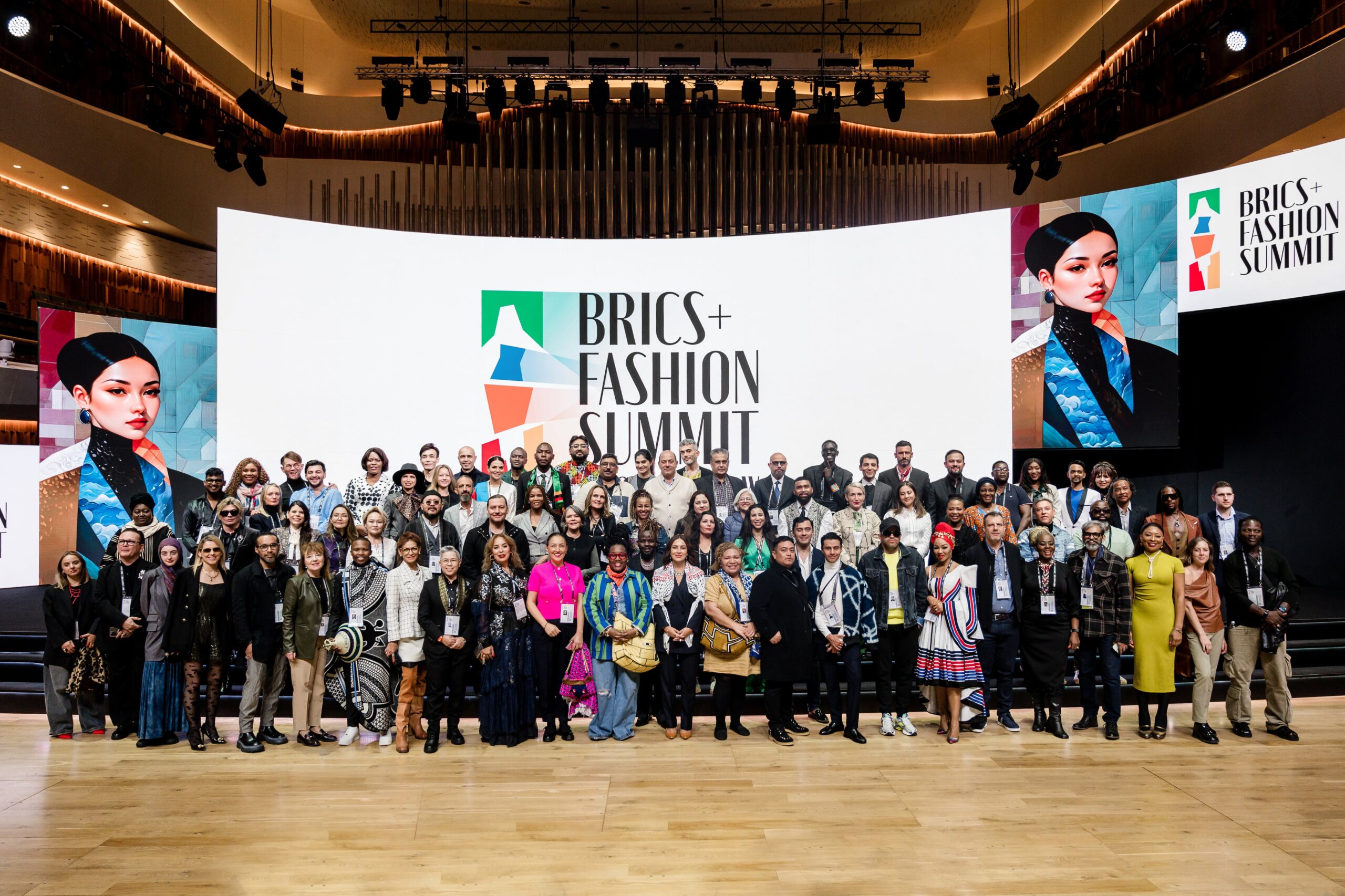
🇷🇺 BRICS International Fashion Federation Launches in Moscow. The BRICS+ Fashion Summit hosted executives from dozens of international fashion week events including those in Algeria, Cambodia, Congo, Costa Rica, Ghana, Jordan, Morocco, Panama, Singapore, Sri Lanka, Qatar and Zambia. Some of these executives joined fashion and textile association CEOs and heads of educational institutions from more than 50 countries to form the BRICS International Fashion Federation. “Fashion brands, designers and markets face common challenges…that can be more effectively addressed through collective action…so there is a need for a platform for emerging markets to amplify our voice,” said BRICS IFF memorandum signatory Sunil Sethi, chairman of the Fashion Design Council of India. The gathering took place at the second edition of the summit which aims to provide cross-border business opportunities between industry leaders in the original group of nations comprising the acronymed bloc (Brazil, Russia, India, China, South Africa) and newer members (Iran, Egypt, Ethiopia, the United Arab Emirates) as well as other countries in their sphere of influence. Held from Oct. 3 to 5 in the Russian capital, the summit coincided with Moscow Fashion Week, the biannual showcase organised by Fashion Foundation which featured over two dozen runway shows this season including local names like Yana Besfamilnaya, Gapanovich and Zhuat, as well as several overseas brands. Largely isolated from their counterparts in Western Europe and North America since the onset of the war in Ukraine, Russian fashion industry events have sought to capture opportunities in Asia, Africa, the Middle East, Latin America and Eurasian Economic Union countries. [BoF Inbox]
🇨🇳 Overseas retailers brace for subdued National Day Golden Week in China. Domestic traffic is expected to be marginally up on last year, with the Ministry of Transport forecasting around 1.94 billion domestic inter-city trips during the Oct. 1-7 period. However, China Market Research Group MD Shaun Rein predicted that the average spend per traveller will be lower. Overseas retailers hoping for a recovery of inbound Chinese tourists have been challenged by subdued traffic due to China’s economic slowdown, with the number of international flights during the holiday standing at 85.5 percent of pre-pandemic capacity in 2019. [Nikkei Asia, CNBC]
🇯🇵 Japan’s lingerie giant Wacoal Holdings acquires UK’s Bravissimo Group. The European subsidiary of the Kyoto-based company founded in 1949 that owns brands including its namesake, Fantasie, Freya, Huit, Elomi and Goddess will purchase the intimates and swimwear brand co-founded by Sarah Tremellen in 1995 for an undisclosed amount. Bravissimo CEO Leanne Cahill will use Wacoal’s wholesale network to pursue international expansion beyond Bravissimo’s current 26 store retail network. [Nikkei Asia, Draper’s]
🇦🇺 Australian apparel group Mosaic Brands to wind down five brands. CEO Erica Berchtold said that the firm will exit the Rockmans, Autograph, Crossroads, W.Lane and BeMe brands “which have become marginal and non-core,” she said, “allowing us to focus on five core growth brands” comprising Millers, Noni B, Rivers and Katies and the namesake Mosaic online marketplace, which will “have a clearly differentiated market proposition, target customer, price point and product range.” [Ragtrader]
🇹🇭 Thai retail giant Central Group to invest $460 million outside Bangkok. The Bangkok-based conglomerate, which owns an extensive portfolio of malls across Asia and controls Selfridges Group department stores in the UK, Ireland and Netherlands, KaDeWe in Germany, Italy’s La Rinascente chain, Illum in Denmark and Globus in Switzerland, is set to invest in new and upgraded mall properties in Thailand’s provinces, from large cities like Chiang Mai to smaller resort towns like Krabi, over a five-year period. [Nikkei Asia]
🇰🇭 US brands concerned for Cambodian workers’ rights group. The American Apparel & Footwear Association (AAFA) has said it has “serious concerns” about the Cambodian government’s investigation into the Phnom Penh-based Center for Alliance of Labor and Human Rights (CENTRAL), after the latter criticised an assessment by the International Labor Organization’s (ILO) Better Factories Cambodia (BFC) programme. The AAFA’s statement listed signatories such as Adidas, Gap, Puma, PVH Corp. and VF Corp. [Sourcing Journal]
🇮🇳 Indian couturier Vaishali S opens Paris boutique. Launched on Sept. 30 during Paris Fashion Week, the Mumbai-based designer opened her first store in the Saint-Germain-des-Prés area of the French capital under her namesake brand Vaishali S. “I wanted to create a space where Indian textiles and crafts are given a global platform and the recognition they deserve,” said founder Vaishali Shadangule, who has shown at Paris Haute Couture Week for several years. [BoF Inbox]
🇨🇳 Shein warehouse workers in China post videos about working conditions. Using social media and video platforms like Bilibili and Kuaishou, users purporting to be logistics gig workers for the China-founded, Singapore-based ultra-fast fashion e-tailer have shared videos outlining their wages, working conditions, and other details about their jobs, including the long hours, rapid speed and high targets some follow. [Wired]
🇮🇳 Foot Locker partners with Metro Brands and Nykaa to enter India. The American footwear retailer has linked hands with Mumbai-based footwear retailer Metro Brands for its physical rollout in the country starting with a store in Delhi’s Select City Walk and with the digital-first fashion and beauty retailer Nykaa for its online expansion in the country. [Economic Times]
🇹🇷 Turkey’s apparel exports decline 6.17 percent in January to August period. Despite a recovery in August the country’s exports fell year over year to $11.74 billion in the eight-month period in 2024, with the knitted clothing category down 3.4 percent and non-knitted apparel down 9.5 percent. [Fibre2Fashion]
🇱🇰 Sri Lanka’s garment exports rise 2.3 percent in January to August period. The country’s exports increased year-over-year to $3.09 billion in the eight-month period in 2024, while textile exports declined by 14.9 percent. Other made-up textile articles rose by 7.3 percent. [Fibre2Fashion]



